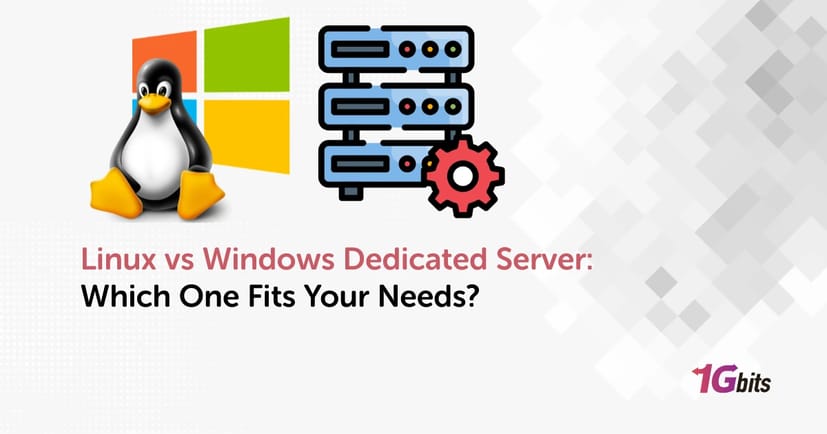Choosing the right dedicated server operating system is a crucial decision that shapes your hosting performance, security, compatibility, and overall costs. Whether you’re launching a large-scale website, running resource-intensive applications, or setting up an enterprise environment, you need to weigh Linux vs Windows dedicated servers carefully to match your technical needs and budget. For a broader look at hosting types, you can also consider the difference between managed vs unmanaged dedicated servers.
In this detailed guide on Linux dedicated server vs Windows, we’ll break down costs, performance, security, software ecosystem, management, scalability, and migration considerations. By the end, you’ll know exactly which dedicated server OS is the best fit for you.
📊 Linux Dedicated Server vs Windows: A Quick Comparison
Below is a side-by-side comparison of Linux dedicated server vs Windows key factors:
| Feature | Linux Dedicated Server | Windows Dedicated Server |
|---|---|---|
| Licensing Cost | Free / Open-source | Paid per-core licensing |
| Performance | Lightweight, efficient for most workloads | Higher resource usage due to GUI overhead |
| Security | Strong peer-reviewed security, fewer attacks | Frequent target of ransomware; built-in Defender |
| Software Compatibility | LAMP/LEMP stacks, open-source tools | .NET, MSSQL, SharePoint, ASP.NET |
| Ease of Management | CLI-driven; requires admin skills | Familiar GUI, Remote Desktop |
| Scalability | Excellent for cloud & containers | Enterprise-ready; tight integration with Azure |
| Vendor Support | Community & third-party support | Official Microsoft enterprise support |
🖥️ What Is a Dedicated Server?
A dedicated server is a physical server rented by a single client, giving you full control over its resources and configurations. Unlike shared hosting, you don’t share CPU, RAM, or bandwidth with other users — ensuring maximum performance and security. For a more detailed explanation of the concept, you can visit our article on what is a dedicated server.
Key benefits of dedicated servers:
- Full root/admin access
- High performance for demanding workloads
- Advanced security configurations
- Greater customization and scalability
Dedicated Server vs VPS Hosting: Thinking about other hosting options? Understanding the difference between dedicated servers and VPS hosting is key to making the right choice for your business.
🐧 Linux Dedicated Server
What It Is
A Linux dedicated server runs on an open-source operating system like Ubuntu, CentOS, or AlmaLinux. It’s typically managed through a command-line interface (CLI) and offers unmatched flexibility for developers and system admins. For those who want to get started quickly, a instant dedicated server with Linux pre-installed can be a great option.
✅ Pros of Linux Dedicated Servers
- Free Licensing & Lower TCO: Linux’s open-source nature means you avoid expensive licensing fees. This significantly reduces your total cost of ownership (TCO), especially for businesses running multiple servers.
- High Performance & Lightweight: Linux is less resource-intensive, allowing more server resources to go directly to your applications. This is why many high-traffic websites and enterprise apps choose Linux.
- Strong Security: Peer-reviewed code, frequent updates, and a massive community contribute to Linux’s reputation for strong security. It’s less targeted by malware compared to Windows.
- Vast Software Ecosystem: Linux works seamlessly with web stacks like LAMP (Linux, Apache, MySQL, PHP) and LEMP (Linux, NGINX, MySQL, PHP), as well as container technologies like Docker and Kubernetes.
❌ Cons of Linux Dedicated Servers
- Learning Curve: Most Linux servers are CLI-driven. If you’re not comfortable with terminal commands, there’s a learning curve. That said, many admin panels like cPanel and Plesk simplify tasks.
- Limited Official Vendor Support: While Linux has a huge community, official vendor support varies depending on the distribution.
Popular Linux Distributions for Dedicated Servers
- Ubuntu LTS: User-friendly, frequent security updates.
- AlmaLinux: Enterprise-grade, stable, CentOS replacement.
- Debian: Lightweight and secure for experienced users.
A Linux dedicated server is often the preferred choice for those who need to get the most out of their resources without the added costs. If you're a gamer, you might also find that a game dedicated server running on Linux can provide excellent performance and customization. Ready to try one? Explore our dedicated Linux hosting solutions!
Windows Dedicated Server
What It Is?
A Windows dedicated server runs on Microsoft’s proprietary Windows Server OS. It’s managed through a familiar graphical user interface (GUI) and offers strong integration with Microsoft’s ecosystem. It is an ideal solution for businesses that rely on Microsoft technologies and require a simple-to-manage server environment.
✅ Pros of Windows Dedicated Servers
- Familiar GUI & Remote Desktop: If you’re used to Windows desktops, managing your server is straightforward via Remote Desktop.
- Seamless Compatibility with Microsoft Tech: Windows servers are the best choice for applications that rely on .NET, MSSQL, ASP.NET, SharePoint, or Active Directory.
- Official Vendor Support & Enterprise SLA: Microsoft provides robust support and enterprise-level service agreements, which is critical for large businesses.
❌ Cons of Windows Dedicated Servers
- Higher Licensing & Infrastructure Costs: Windows servers require a paid license per core, which adds up fast. They also tend to need more powerful hardware to run smoothly. You can find more cost-effective solutions by checking out our dedicated server outlet.
- Heavier Resource Demands: The GUI and background services consume more CPU and RAM compared to Linux.
- More Malware Exposure: Windows systems are a frequent target for ransomware and other cyberattacks, making proactive security essential. You can find helpful Security Tips for Your Dedicated Windows Server in our guide.
Comparison Sydney dedicated servers with global options: When choosing a server, location is also a major factor. Depending on your target audience, a dedicated server in a specific location like Sydney can offer lower latency and better performance.
Looking to deploy a Windows-based project? Get started with our windows dedicated server.
🔎 Deep-Dive Comparison of Linux vs Windows Dedicated Servers
💲 Cost & Total Cost of Ownership
Linux has a clear cost advantage with its free licensing model. You pay nothing for the OS, which means more budget for hardware upgrades or scaling your infrastructure. Windows requires per-core licensing and client access licenses (CALs), driving up costs — especially for enterprise setups. You can see how these costs compare on our dedicated server pricing page.
However, consider admin costs too. If your team lacks Linux skills, training or hiring a Linux expert could easily offset the licensing savings.
⚡ Performance & Resources
Linux’s lightweight design uses fewer system resources, leaving more capacity for your applications. It’s ideal for:
- High-traffic websites
- Database servers
- Containers & microservices
Windows’ GUI makes management easier but increases CPU and RAM usage. It shines when you need:
- Windows-only software
- .NET web apps
- Remote Desktop environments
When high performance is critical, you may want to consider a GPU dedicated server, regardless of the OS you choose.
🛡️ Security & Stability
Linux’s open-source community and peer-reviewed code help identify vulnerabilities quickly. Most malware targets Windows, so Linux often sees fewer threats.
Windows Server includes tools like Windows Defender, but its popularity makes it a frequent ransomware target. Frequent patching and robust backups are a must. A stable server is also crucial for overall reliability, which is why topics like how Tampa dedicated servers improve website loading speed are so important.
🧩 Software Ecosystem & Use Cases
Linux: Perfect for open-source stacks like WordPress, Magento, or custom apps using LAMP/LEMP. Containers (Docker, Kubernetes) and modern DevOps pipelines are deeply rooted in Linux. For those in Europe, the benefits of hosting in Europe can also provide an advantage with specific software and compliance regulations.
Windows: Ideal if your apps rely on Microsoft technologies. ASP.NET web apps, MSSQL databases, SharePoint, and AD domain controllers run natively.
Want help choosing the best OS? Here’s our in-depth guide: Best OS for Dedicated Servers.
🧑💻 Ease of Management
Linux favors experienced admins comfortable with the CLI. Tools like cPanel, Plesk, or Webmin help make things easier. Windows offers Remote Desktop and a user-friendly GUI, making server tasks intuitive even for newcomers. For those who want more hands-on learning, we have a variety of dedicated server tutorials available.
☁️ Scalability & Cloud Integration
Linux is the backbone of modern cloud-native architecture. It’s favored for containerized apps, microservices, and multi-cloud deployments. For a related topic, you might be interested in our comparison of Atlanta dedicated servers vs. cloud hosting.
Windows shines in hybrid enterprise environments and integrates tightly with Microsoft Azure. The ability to scale is a major factor in choosing a server, much like the debate over dedicated server with crypto payments, which offers another form of flexibility.
📈 Which One Should You Choose?
Use this quick Dedicated Server Linux vs Windows checklist to match your needs with the right OS:
| Choose Linux If… |
|---|
| ✅ You want lower licensing costs. |
| ✅ Your apps run on LAMP/LEMP stacks. |
| ✅ You need top performance for web and database workloads. |
| ✅ You plan to deploy containers or DevOps pipelines. |
| ✅ You have Linux admin skills or a managed provider. |
| Choose Windows If… |
|---|
| ✅ Your apps require .NET, MSSQL, or Windows-only software. |
| ✅ You need Remote Desktop for management. |
| ✅ You run an enterprise Microsoft ecosystem (AD, SharePoint). |
| ✅ You want official Microsoft support and SLAs. |
The choice between these two powerful options often comes down to your technical expertise, specific software requirements, and budget. If you are looking for a more hands-on experience and want to control every aspect of your server, an unmanaged dedicated server might be the perfect fit for you.
Looking for trusted providers? Here’s our list of the Best Dedicated Server Providers.
🛠️ Implementation Tips
Secure your OS
Whether you choose a Linux dedicated server or a Windows dedicated server, hardening security should be your top priority. For Linux, disable root login via SSH, use strong key-based authentication instead of passwords, and regularly update firewall rules (e.g., using iptables or ufw). For Windows, secure Remote Desktop Protocol (RDP) by changing the default port, enforcing strong passwords, and enabling Network Level Authentication (NLA). Always keep your server OS and all installed packages up to date with the latest security patches, and run periodic malware scans using trusted tools like ClamAV for Linux or Windows Defender. For optimal security, especially with web servers, you might also want to consider the benefits of a dedicated IP.
Choose the right version
Opt for Long-Term Support (LTS) versions for Linux distributions such as Ubuntu LTS or AlmaLinux for maximum stability and community support. LTS versions receive security updates for an extended period, making them ideal for production workloads. For Windows, consider using Windows Server Core for workloads that do not require a GUI—this minimal installation reduces the attack surface, uses fewer resources, and can be easier to maintain securely.
Backups & monitoring
Never run a dedicated server without an automated backup plan. Implement offsite or cloud backups using solutions like rsync, BorgBackup (Linux), or Windows Server Backup. For real-time monitoring, tools like Nagios, Zabbix, or Prometheus can help track server performance and detect anomalies on Linux servers. Windows admins can leverage built-in tools like Windows Event Viewer, Performance Monitor, and third-party solutions like SolarWinds to catch issues early and ensure high availability.
Test before migration
Before you migrate an application or service to your dedicated server, test thoroughly in a staging or sandbox environment that replicates your production settings. Validate compatibility with the new OS, ensure that performance benchmarks meet your needs, and run security checks to identify potential vulnerabilities. This approach helps avoid costly downtime or unexpected bugs after you go live.
For more OS-specific tips, see our detailed guide on Choosing the Best OS for Dedicated Servers.
🔄 Migration Considerations
Switching from a Windows dedicated server to Linux—or vice versa—can be a smart move if your business needs change. But plan your migration carefully:
Plan for staff training
Linux servers often rely on command-line interfaces and shell scripting for routine tasks. If your team is new to Linux, budget time for training in basics like SSH, sudo, and package managers (e.g., apt, yum). Conversely, moving to Windows means understanding Active Directory, Group Policy, and Windows administrative tools.
Budget for licensing & resources
Migrating from Linux (which is license-free) to Windows means factoring in licensing costs for Windows Server, user access, and any associated Microsoft software like MSSQL or Exchange. Also, ensure your hardware meets Windows’ higher resource requirements, especially if moving from a lightweight Linux environment.
Minimize downtime
A smooth cutover plan is critical. Perform migration tests using a replica of your live environment to validate that your websites, databases, or applications work as expected. Use tools like rsync or robocopy for data transfer, and schedule the final switchover during off-traffic hours to minimize business disruption. Always have a rollback plan in case you encounter issues during migration.
For a more in-depth look at what a dedicated server is and how it can fit into your hosting strategy, visit our What is a Dedicated Server article.
🎯 Linux vs Windows Dedicated Server: Final Verdict
There’s no universal “best” OS — it all depends on your use case. If cost, flexibility, and performance matter most, a Linux dedicated server is hard to beat. But if you rely on the Microsoft ecosystem or need easy GUI management, a Windows dedicated server is worth the premium.
Whatever you choose, 1Gbits has your back with powerful, reliable dedicated server solutions. Ready to get started?
👉 Learn more about dedicated Linux hosting or windows dedicated server.
For those who need a budget-friendly option, consider our cheap dedicated server solutions. They provide the power and reliability you need without breaking the bank.










